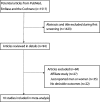Smoking status and subsequent gastric cancer risk in men compared with women: a meta-analysis of prospective observational studies
- PMID: 31014273
- PMCID: PMC6480657
- DOI: 10.1186/s12885-019-5601-9
Smoking status and subsequent gastric cancer risk in men compared with women: a meta-analysis of prospective observational studies
Abstract
Background: Smoking is one of the well-established risk factors for gastric cancer incidence, yet whether men are more or equally susceptible to gastric cancer due to smoking compared with women is a matter of controversy. The aim of this study was to investigate and compare the effect of sex on gastric cancer risk associated with smoking.
Methods: We conducted a systemic literature search in MEDLINE, EMBASE, and the Cochrane CENTRAL databases to identify studies published from inception to December 2018. We included prospective observational studies which reported effect estimates with 95% confidence intervals (CIs) for associations of current or former smokers with the incidence of gastric cancer by sex. We calculated the ratio of relative risk (RRR) with corresponding 95% CI based on sex-specific effect estimates for current or former smokers versus non-smokers on the risk of gastric cancer.
Results: We included 10 prospective studies with 3,381,345 participants in our analysis. Overall, the summary RRR (male to female) for gastric cancer risk in current smokers was significantly increased compared with non-smokers (RRR: 1.30; 95% CI: 1.05-1.63; P = 0.019). Furthermore, there was no significant sex difference for the association between former smokers and gastric cancer risk (RRR: 1.20; 95% CI: 0.92-1.55; P = 0.178). However, the result of sensitivity analysis indicated the pooled result was not stable, which was altered by excluding a nested case-control study (RRR: 1.31; 95% CI: 1.10-1.57; P = 0.002).
Conclusion: This systematic review showed a potential sex difference association between current smokers and the risk of gastric cancer. The sex differential in smokers can give important clues for the etiology of gastric cancers and should be examined in further studies.
Keywords: Cancer risk; Gastric cancer; Meta-analysis; Sex; Smoking.
Conflict of interest statement
Ethics approval and consent to participate
Not applicable.
Consent for publication
Not applicable.
Competing interests
The authors declare that they have no competing interests.
Publisher’s Note
Springer Nature remains neutral with regard to jurisdictional claims in published maps and institutional affiliations.
Figures







References
-
- Ferlay J, Colombet M, Soerjomataram I, et al. Estimating the global cancer incidence and mortality in 2018: GLOBOCAN sources and methods. Int J Cancer. 2018. 10.1002/ijc.31937. - PubMed
Publication types
MeSH terms
Grants and funding
LinkOut - more resources
Full Text Sources
Medical

